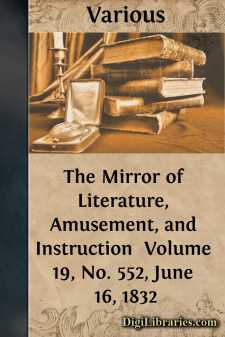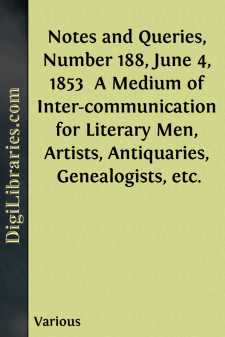Categories
- Antiques & Collectibles 13
- Architecture 36
- Art 48
- Bibles 22
- Biography & Autobiography 813
- Body, Mind & Spirit 142
- Business & Economics 28
- Children's Books 14
- Children's Fiction 11
- Computers 4
- Cooking 94
- Crafts & Hobbies 4
- Drama 346
- Education 46
- Family & Relationships 57
- Fiction 11829
- Games 19
- Gardening 17
- Health & Fitness 34
- History 1377
- House & Home 1
- Humor 147
- Juvenile Fiction 1873
- Juvenile Nonfiction 202
- Language Arts & Disciplines 88
- Law 16
- Literary Collections 686
- Literary Criticism 179
- Mathematics 13
- Medical 41
- Music 40
- Nature 179
- Non-Classifiable 1768
- Performing Arts 7
- Periodicals 1453
- Philosophy 64
- Photography 2
- Poetry 896
- Political Science 203
- Psychology 42
- Reference 154
- Religion 513
- Science 126
- Self-Help 84
- Social Science 81
- Sports & Recreation 34
- Study Aids 3
- Technology & Engineering 59
- Transportation 23
- Travel 463
- True Crime 29
Sort by:
by:
Various
THE BRAHMIN BULL, IN THE ZOOLOGICAL GARDENS, REGENT'S PARK. The Zoological Society possess several Zebus, or Indian oxen. These were formerly considered a distinct species, but zoologists are now of opinion that the Zebu is merely a variety of the common ox, "although," as Mr. Bennett observes, "it is difficult to ascertain the causes by which the distinctive characters of the two...
more...
by:
Various
The Latest Viewpoints of Men Worth While An Old Business Man Testifies to the Progress the World Has Made Since Seventy Years Ago—Lewis Carroll's Advice on Mental Nutrition—Rudyard Kipling Defines What Literature Is—Richard Mansfield Holds That All Men Are Actors—Professor Thomas Advances Reasons for Spelling-Reform—Helen Keller Pictures the Tragedy of Blindness—With Other Expressions...
more...
by:
Various
INTRODUCTION. This collection of epitaphs was started in a very modest fashion about thirty-five years ago, when the compiler found great pleasure in searching all the graveyards near her Vermont home for quaint inscriptions upon old tombstones. It was neither a morbid curiosity nor a spirit of melancholy that attracted her to the weather-beaten slabs of marble and slate, but rather a fondness for...
more...
by:
Various
BRAMBLETYE HOUSE. On the borders of Ashdown Forest, in the county of Sussex, stands the above picturesque ruin of Brambletye House, whose lettered fame may be dated from the publication of Mr. Smith's novel of that name, in January, 1826. The ruin has since attracted scores of tourists, as we were, on our recent visit, informed by the occupier of the adjoining farm-house; which circumstance...
more...
by:
Various
THE BIRTH OF THE PRINCE OF WALES. (By the Observer’s own Correspondent.) It will be seen that we were not premature in announcing the probability of the birth of a Prince of Wales; and though it was impossible that any one should be able to speak with certainty, our positive tone upon the occasion serves to show the exclusive nature of all our intelligence. We are enabled now to state that the Prince...
more...
by:
Various
NOTES ON SEVERAL MISUNDERSTOOD WORDS. (Continued from p. 522.) Dare, to lurk, or cause to lurk; used both transitively and intransitively. Apparently the root of dark and dearn. "Here, quod he, it ought ynough suffice, Five houres for to slepe upon a night: But it were for an olde appalled wight, As ben thise wedded men, that lie and dare, As in a fourme sitteth a wery hare." Tyrwhitt's...
more...
by:
Various
THE PROCESSION OF THE FLOWERS. In Cuba there is a blossoming shrub whose multitudinous crimson flowers are so seductive to the humming-birds that they hover all day around it, buried in its blossoms until petal and wing seem one. At first upright, the gorgeous bells droop downward, and fall unwithered to the ground, and are thence called by the Creoles "Cupid's Tears." Frederika Bremer...
more...
by:
Various
THE SHAKESPEARE MYSTERY. In 1853 there went up a jubilant cry from many voices upon the publication of Mr. Collier's "Notes and Emendations to the Text of Shakespeare's Plays from Early Manuscript Corrections," etc. "Now," it was said, "doubt and controversy are at an end. The text is settled by the weight of authority, and in accordance with common sense. We shall enjoy...
more...
by:
Various
John Chinaman is the logician of hygiene. To his family doctor he says: "I pay you to keep me well. Earn your money." Let him or his fall sick, and the physician's recompense stops until health returns to that household. Being fair-minded as well as logical, the Oriental obeys his physical guardian's directions. Now, it may be possible to criticize certain Chinese medical methods,...
more...
by:
Various
Verona SPIRIT OF THE ANNUALS FOR 1830. Fair and gentle readers, we present you with a kaleidoscopic view of some of these elegant trifles—the very bijouterie of art and literature—in picture outmastering each other in gems of ingenuity, and in print, exalting a thousand beautiful fancies into a halo of harmony and happiness for the coming year. We call these "trifles," but in the best sense...
more...











